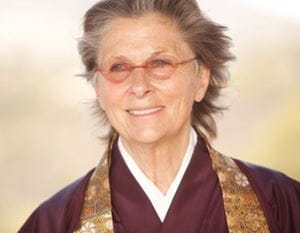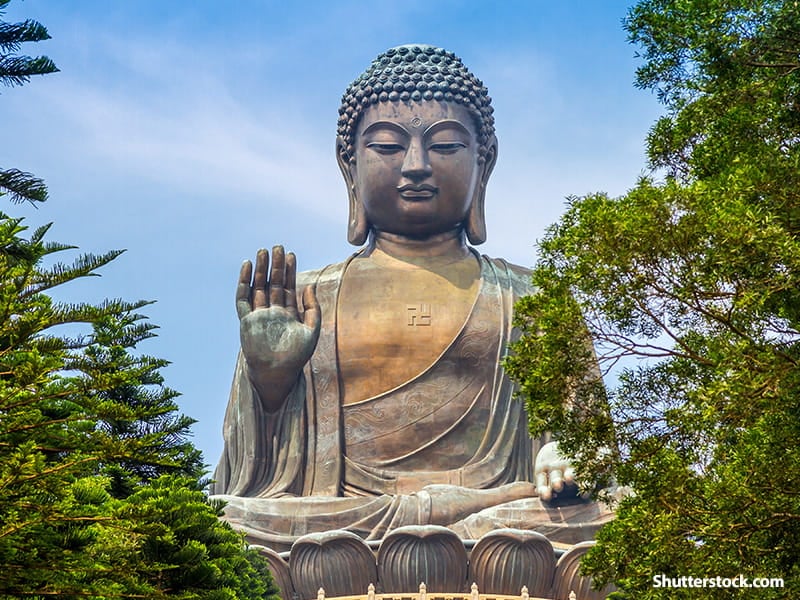
Q. What are your thoughts about participating in the Newark Peace Education Summit?
A. I feel very joyful, honored and I also feel grateful to have the opportunity to interact with His Holiness in the context of peace and with two such extraordinary women as [Shirin] Ebadi and [Jody] Williams. It affords the world a great opportunity to look at issues in relation to human rights and world peace. So, I’m very excited about this conference. It happening in Newark is important, because Newark is a place that has been very socially vulnerable in the past, and to bring this kind of energy into Newark is a visionary idea.
Q. How will you be bring your years of study to the Summit?
A. My work has been in the field of engaged Buddhism. That is my own practice, which began in 1965 that formed the base for the work I was doing in the civil rights and anti-war movement. I feel that my perspective is about bringing a Buddhism that is applied into the world in terms of not only personal transformation, but also social transformation and in an endeavor to really address issues related to structural violence.
Q. You’ve gone through times of personal struggle. How did Buddhism help restore you?
A. For me, Buddhism is a psychology and a philosophy that provides a means, upayas, for working with the mind. Through my own developmental struggles -- which seem from one point of view unending, but certainly were more critical in my 30s than they are now -- Buddhism was a raft that brought me to the shore of sanity and stability. It’s also provided a means for me to intentionally cultivate more empathy and compassion, more kindness and also more courage in my life.
A. I do. When I first was exposed to Buddhism in the mid-1960s, I said it was so practical and utterly pragmatic. That’s what attracted me to Buddhism. It wasn’t a teacher. It wasn’t a sense of devotion. It was more that the upayas, the skillful means in Buddhism, were extraordinarily accessible. They’ve been re-characterized in the Western context so that Buddhist practice is even more accessible to every kind of person. I’ve worked in the prison system, on death row and maximum security. I did that work for six years. I’ve worked with some of the most difficult people in our society. Buddhism was accessible and helpful for these individuals. I see no reason why people from all walks of life can’t benefit from training their minds and really opening their hearts and basing their lives on compassion.
Q. In a conference like this, what do you expect the outcome to be?
A. From one point of view, who knows? One can’t ever know what the outcome will be. I did talks and teachings years ago, and years later people came back and said it benefited them. One of the things I do know about these kinds of events are they are modeling intercultural, interfaith, and interpolitical communication. [It] has the potential for being a model of possibility in the world -- where people are basing their relationships not only on friendship and respect, but also a shared aspiration to bring peace. I think this conference has a tremendous possibility to affect positive change in the world.
About the conference:
The Newark Peace Education Summit is a three-day conference focusing on peacemaking practices from around the world. The conference is structured as a comprehensive, exploration of the many aspects of peacemaking, beginning with the practices of finding peace within the self, then subsequently radiating outward to peace within the home, peace through education, peace in the community, the world and the planet. Each day the activity will consist of a combination of large-scale panel discussions, which will then break into practical workshops for further exploration of the various topics discussed.
Nobel Peace Laureates, His Holiness the Dalai Lama, who will be involved in the first two days of the summit, Shirin Ebadi, the Iranian human rights advocate, and Jody Williams, the American anti-landmine activist, will be among the many peace leaders speaking at the panel sessions. Other panelists and workshop leaders include: Newark Mayor Cory Booker, Martin Luther King III, Robert Thurman, Deepak Chopra, Marianne Williamson, Goldie Hawn, Soledad O’Brien, Ed Norton, Donna Karan, Van Jones, Jeffrey Sachs, Majora Carter, the Kogui Shaman of Columbia, South America, Somaly Mam, Cameron Sinclair, Russell Simmons and may more distinguished peace advocates from a wide cross section of cultures, disciplines and perspectives.
The summit hopes to begin a dialogue that continues long after the participants physically disperse, by providing new media tools for continued interaction and conversation between participants and attendees. The event will be held at the NJPAC (New Jersey Performing Arts Center) in Newark, New Jersey, May 13-15, 2011 and is being co-convened by Tibet House US and the Drew A. Katz Foundation. In addition to these events there will be group yoga practices, meditations, a wellness fair and many other activities. For tickets visit NJPAC.ORG and Newarkpeace.org. Do not miss this precious opportunity to cultivate peace.

